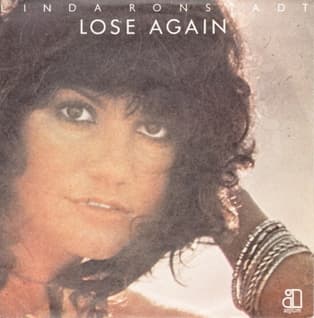
A Wistful Chronicle of Love’s Inevitable Defeat
The Echoes of a Heart’s Surrender: Linda Ronstadt‘s “Lose Again”
There are certain songs that, the moment the first notes drift from the speaker, transport you back to a specific time, a specific feeling—often one tinged with the beautiful melancholy of youth and the hard-won wisdom of hindsight. “Lose Again” by the incomparable Linda Ronstadt is one such masterpiece. Released in 1976 as the second single from her landmark album, Hasten Down the Wind, this track wasn’t just another hit; it was a deeply reflective moment that cemented Ronstadt’s status as the quintessential interpreter of heartbreak in the 1970s. The song’s initial journey on the charts was modest yet significant: while it didn’t achieve the crossover pop success of its immediate predecessor, “That’ll Be the Day,” the single peaked at No. 26 on the Billboard Easy Listening chart, demonstrating its immediate resonance with adult listeners who appreciated its maturity and lyrical depth. More importantly, the Hasten Down the Wind album itself—the home of this profound cut—ascended to No. 3 on the Billboard 200 and ultimately earned Ronstadt her first Grammy Award for Best Female Pop Vocal Performance, forever elevating “Lose Again” within her revered catalog.
The story behind “Lose Again” is one woven from the threads of collaborative genius and Ronstadt’s unique skill for selecting material that seemed custom-written for her emotional range. Unlike many of the chart-toppers Ronstadt was known for—such as those by Buddy Holly or Roy Orbison—this particular track was a contemporary composition penned by the immensely talented Karla Bonoff. Bonoff, a relatively new artist on the L.A. singer-songwriter scene at the time, was already recognized for her poignant, introspective writing, and Ronstadt became one of her earliest and most fervent champions. Ronstadt’s cover of Bonoff’s “Someone to Lay Down Beside Me” became the A-side of the single’s initial release, with “Lose Again” serving as the B-side, yet it was “Lose Again” that truly captured the quiet devastation of the song cycle. Ronstadt discovered Bonoff’s songs through their mutual circle of musician friends, and she immediately saw in the lyrics a powerful articulation of feelings many listeners were grappling with but couldn’t quite name.
The meaning of “Lose Again” is deceptively simple: it’s an honest, almost weary meditation on the pre-emptive surrender to inevitable romantic failure. It captures that exquisite, painful moment when a person enters a new relationship not with giddy hope, but with the full, clear knowledge that it will, eventually, dissolve. The singer isn’t lamenting a past loss; she is recognizing the pattern—the cyclical nature of her romantic life. The key line, “It looks like I’m gonna lose again,” isn’t a question or a plea; it’s an acknowledgement, a resignation to fate. The additional accurate information that makes this track so rich is its signature production style, characteristic of the era and the Eagles‘ influence that permeated Ronstadt’s work. Produced by John Boylan, the arrangement is sparse and elegant, built around a melancholy piano, subtle, weeping steel guitar, and a rhythm section that provides a gentle, almost funereal pace. It leaves ample space for Ronstadt’s crystal-clear, aching voice to hover over the track, delivering Bonoff’s words with a profound, almost devastating sincerity. Listening to it now, decades later, you don’t just hear a hit song; you hear the soundtrack to every cautious, bittersweet step we ever took toward love, knowing deep down that happiness can sometimes be the most temporary of leases. It reminds us that sometimes, the bravest thing we can do is simply acknowledge the coming storm before the first drop of rain even falls.